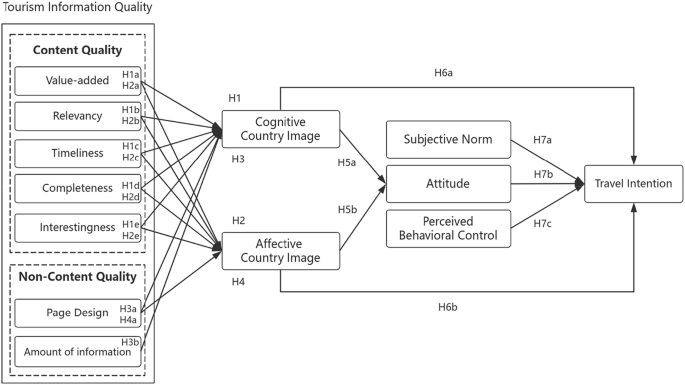
"Social media has become an increasingly vital communication tool in modern tourism marketing, driven by the rapid advancement of mobile internet and smart tourism infrastructure (Li et al., 2021; Leung et al., 2023). Compared with traditional social media, its information dissemination presents the characteristics of fragmentation, timeliness, and social fission (Ho et al., 2012). In recent years, numerous studies have found that tourism information on social media can help enhance tourists' desire to travel (Zhao & Zhou, 2021; Cheung et al., 2022). Tourism information quality is the extent to which it satisfies travelers' needs (Yeap et al., 2014), which is mainly divided into content quality (relevancy, value-added, completeness, timeliness, and interestingness) and non-content quality (amount of information, page design)."
"The theory of planned behavior (TPB) states that travelers' behavioral intention is influenced by their subjective norms, attitudes, and perceived behavioral control (Ajzen, 1991). This provides a theoretical framework for analyzing the impact of tourism information quality on tourists' overseas travel intention. Most previous studies have focused on the relationship between tourism information quality and destination image (Kim et al., 2017; Wang et al., 2023). However, within the context of overseas tourism, the cognitive basis for tourists' attitudes towards the destination is more important than the general sense of destination image (Dedeoğlu, 2019). In particular, a positive country image helps to attract foreign tourists (Kotler & Gertner, 2002)."
Social media has become an increasingly vital communication tool in modern tourism marketing due to mobile internet and smart tourism infrastructure. Social media information dissemination is characterized by fragmentation, timeliness, and social fission. Tourism information quality satisfies travelers' needs and comprises content quality (relevancy, value-added, completeness, timeliness, interestingness) and non-content quality (amount of information, page design). Content and non-content quality can construct destination image through heuristic and systematic processing. The theory of planned behavior identifies subjective norms, attitudes, and perceived behavioral control as determinants of travel intention. Cognitive attitudes and positive country image play crucial roles in overseas travel decisions.
Read at Nature
Unable to calculate read time
Collection
[
|
...
]